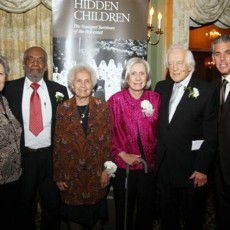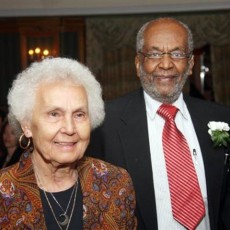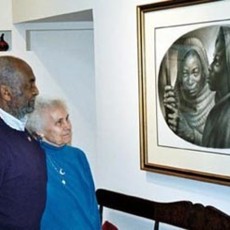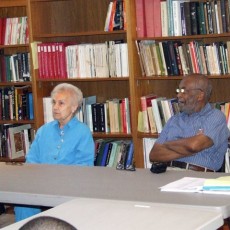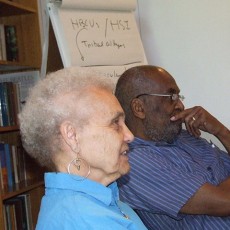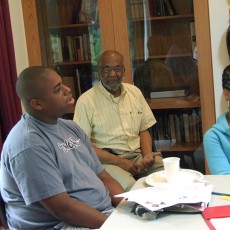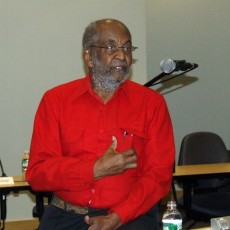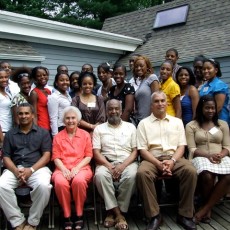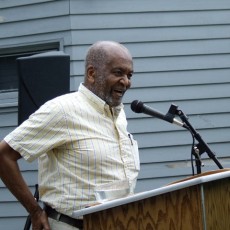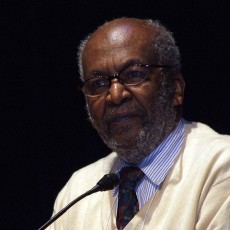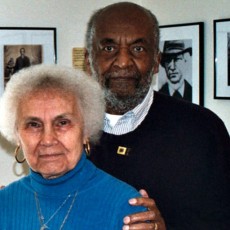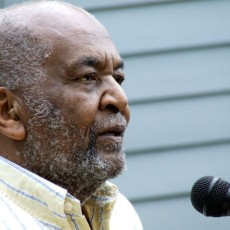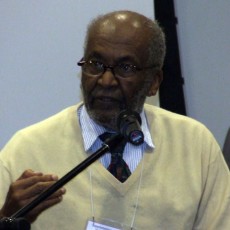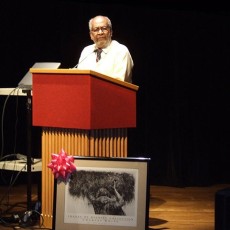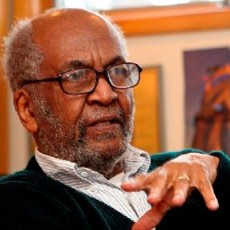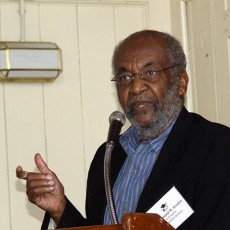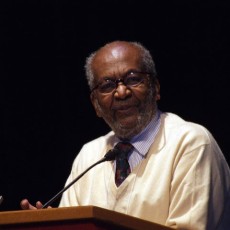Edmund Gordon
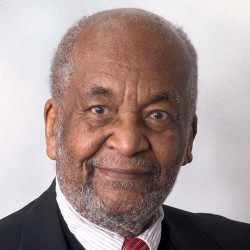
Edmund W. Gordon is the John M. Musser Professor of Psychology, Emeritus at Yale University, Richard March Hoe Professor, Emeritus of Psychology and Education at Teachers College, Columbia University and Director Emeritus of the Institute for Urban and Minority Education at Teachers College, Columbia University. He is also the Senior Scholar in Residence at the SUNY Rockland Community College. Distinguished by a career spanning more than six decades in professional practice; scholarly life as a minister; and work as a clinical and counseling psychologist, Dr. Gordon has authored more than 200 articles and eighteen books. He has also been elected Fellow of various prestigious associations including the American Psychological Association and American Association for the Advancement of Science. Further recognized by the National Academy of Education and Educational Testing Service for his contributions to developments in education such as Head Start, compensatory education, and supplementary education, Dr. Edmund Gordon and his wife, Dr. Susan G. Gordon, M.D. claim their four children as their most important achievements.
For more information, visit Edmund Gordon’s Website. To learn more about Edmund Gordon from his family and friends, visit his Reflections. To view photographs from Edmund Gordon’s personal collection, visit his Photo Gallery.
Curriculum Vitae Suggested readingsVisit the video below to watch a short overview of the interview with Edmund Gordon. Otherwise, see all five of the full interviews with Edmund Gordon below.
Video Interviews with Edmund Gordon:
Born in a small, highly segregated “tobacco town” in North Carolina, Dr. Edmund Gordon enjoyed a comfortable childhood with his father, a practicing physician who had emigrated from Jamaica; mother, a former elementary school teacher; and two siblings. After earning both an undergraduate degree in biology and graduate degree in social ethics from Howard University, Gordon pursued a doctoral degree in psychology at Teachers College, Columbia. Gordon, married to his wife, Dr. Susan G. Gordon, M.D. for 62 years, cites their four children as their most important achievements. Watch this clip to hear Dr. Gordon’s secrets to a happy marriage and the lessons the Gordon children learned from their father.
Citing his mentor and friend, W.E.B. Du Bois, as influential in his own personal and professional growth, Dr. Edmund Gordon explains the role of the interactionist perspective in his critical thinking. After six decades as a psychologist and research scientist, Gordon remains, according to his friend and colleague, Dr. Wade Boykin, “on the cutting edge of issues.” After extensively studying defiers of negative prediction, Gordon has more recently emphasized less conventional means of school reform in an effort to serve the needs of more students. When watching this clip, be prepared to hear Dr. Gordon challenge the current use of assessments and to learn about his exciting new project.
Commissioned by President Lyndon Johnson in 1965 to help design the Head Start Program, Dr. Edmund Gordon reflects on the triumphs and disappointments of the nation’s largest and most comprehensive early childhood education experiment. Gordon also conducted research that would be used to prove to the Supreme Court that school segregation had harmful effects on children. In keeping with their commitment to serve others, Gordon and his wife, Dr. Susan G. Gordon, M.D., have established a museum, archive, and community center, the CEJJES Institute, near their home to commemorate the African American Diaspora and serve the citizens of Rockland County. Tune in to learn about Dr. Gordon’s vision for changing national policy to include equal emphasis on supplemental and compensatory education.
Inspired by human effort to overcome adversity, Dr. Edmund Gordon cites “responsibility” and “intellect” as his favorite words. Fascinated by structures such as the Golden Gate and George Washington Bridges, Gordon admits he would have become an engineer or perhaps an architect had he not chosen to study psychology and education. When challenged to identify a profession he would rather avoid, Gordon quickly points to the commercialization faced by undertakers as a reason to dismiss that hypothetical career option. View this clip to discover who Dr. Gordon would like to take to dinner and what he would like to hear upon his arrival at Heaven’s gates.
In this clip, Dr. Edmund Gordon offers words of wisdom to graduate students aspiring to positively impact the field of education, emphasizing their need to recognize and understand multiple perspectives when producing knowledge. Applying the principles of health maintenance to education, Gordon continues to argue for “open and equitable access to schools” in addition to polity, a sense of inclusion in the learning process, for students. Watch this clip to hear Dr. Gordon justify further study of bi-directional knowledge production and explain the value of hermeneutics for American students today.
Amrein-Beardsley, A. (2010, November 12). Inside the Academy video interviews with Dr. Edmund Gordon [Video files]. Retrieved from /inside-the-academy/edmund-gordon

Dr. Eleanor Armour-Thomas
“Gentle, generous, wise, learned, [and] compassionate”-Dr. Eleanor Armour-Thomas characterizes Dr. Edmund W. Gordon, her one-time professor who became a lifelong mentor, colleague, and friend, using these carefully selected adjectives. Conveying both his sense of humor and comedic abilities, Eleanor recounts Edmund’s entertaining imitation of the “happy walker,” his own mockery of someone’s attempt to walk uphill to a hotel room after having too much to drink. In addition to fostering a fulfilling personal life by spending time with family and friends, Eleanor cites Edmund’s professional contributions to educational research as profound-his most significant accomplishment, according to Eleanor, being his “interactionist perspective” which he used to “account for the relationship between human diversity, learning, and behavior.” This lens provided for a “new direction” for research, teaching, and assessment of diverse populations.
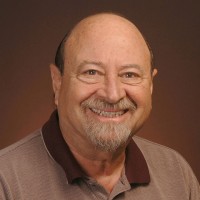
Dr. David Berliner
Dr. David Berliner summarized one of Dr. Edmund W. Gordon’s many pedagogical lessons, clearly stating: “the interaction between dozens of personalogical and dozens of environmental variables leads inexorably to the need for some form of adaptive education or differentiated instruction.” Rather than pose simple solutions to problems in our ailing educational system, Edmund characterizes the work undertaken by educators as complex. By emphasizing human diversity in his own scholarship, Edmund has profoundly impacted minority students and their communities, especially African-American children from working-class families, through the employment of “culturally responsive” pedagogy.
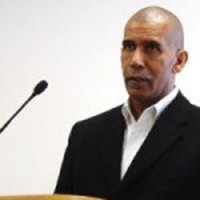
Dr. Wade Boykin
“A quintessential scholar activist”-Dr. Wade Boykin fondly characterizes Dr. Edmund W. Gordon, his “mentor, friend, and collaborator” of more than three decades, as demonstrating the “perfect blend of scholarship and activism.” Wade describes his mentor as “more than just a glorified academic advisor or a teacher.” Since first approaching him in 1975 at a conference, Wade has developed a close friendship with Edmund, sharing conversations that often “perseverate with [him] for days” in addition to the joy of working together. Citing Edmund’s most significant professional accomplishment as his open-mindedness, desire to grow intellectually, and willingness to alter his perspective with changing times, Wade credits these traits with keeping Edmund “on the cutting edge of issues even after an approximately sixty year career.” Kind-hearted and soft-spoken yet strong, Edmund possesses the ability to “speak with great power.” To Wade and others, Edmund has proven to be both “a role model [and] confidante.”
Dr. Ana Mari Cauce
As her dissertation and Ph.D. advisor when a graduate student at Yale, Dr. Ana Mari Cauce credits Dr. Edmund W. Gordon with guiding her intellectual and personal growth. Citing his personal and professional influence, Ana Mari recalls an incident with her own graduate students at the University of Washington where debate ensued over the origin of a simple gesture-folding hands on the top of one’s head. A few months later, Ana Mari and her students were amused to observe Edmund at a professional meeting, exhibiting the same unique body language. With the mystery solved, Ana Mari highlights Edmund’s significant contributions “as a man, as a mentor, and as a professional.” In addition to his well-known work on the minority-majority achievement gap, Edmund’s earlier work on the “defiers of negative prediction” was most inspirational to Ana Mari who found solace in his cajoling and encouragement. His “unwavering belief that one’s circumstances need not define one’s aspirations” inspired self-confidence in graduate students including Ana Mari. Exhibiting all the traits required by Ana Mari’s definition of a “good man,” she describes Edmund as “one of the world’s most thoroughly decent people I have ever met.”
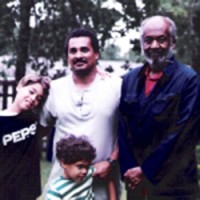
Chris Gordon
Describing his relationship with his dad, Dr. Edmund W. Gordon, as one built on “love, respect, and admiration for each other as caring individuals,” Chris Gordon cites their common interests as including a “love for learning and…passion for serving the greater good.” According to Chris, his dad describes himself as a humanist, insisting that ‘it is the responsibility of those who have been privileged, to use the fruits of that privilege…to help those who are less well off.’ While Edmund truly lives a “life in the service of others,” his time spent with family and friends is equally important. Remembering an incident when his father, a perpetual bargain hunter, bought chicken in a can on a summer vacation to Maine because he believed the purchase to be a “good deal,” Chris recalls the pressured cooked contents of the can to be so old that they were hardly edible. Characterizing his father’s most significant professional accomplishment as his introduction “into the national dialogue the importance of understanding the learner’s frame of reference in the development of an educational plan of action,” Chris admires his father’s pairing of the nature of learning with the social context of the learner-the subsequent impact of this discussion on teaching influenced a whole generation of educators.
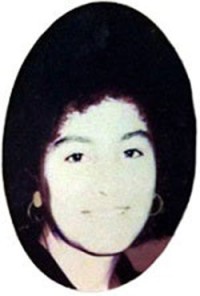
Dr. Jessica Gordon Nembhard
Fondly recalling her father’s influence throughout her life without ever remembering him losing his temper or raising his voice, Dr. Jessica Gordon Nembhard describes her relationship with both her parents, Dr. Edmund W. Gordon and Dr. Susan G. Gordon, as very close. Citing the profound impact on her professional growth of her first three summer jobs with her father as a research assistant at Teachers College, Columbia University, Jessica maintained an interest in education long after graduation. Eagerly sharing happy family memories gathered on trips, while playing games, and during social events with friends, Jessica quickly highlights her father’s dedication to his work which he “usually brought with him wherever he went, including [to] a dinner party with a neighbor.” Crediting her parents with the significant personal accomplishment of raising four “accomplished and lovely human beings who do good in this world,” Jessica also praises her father’s considerable professional achievements-particularly his efforts to “change how society understands and approaches the education of low status people.” Proud of her father, the “servant leader, activist scholar, and problem solver,” Jessica describes Edmund as “the most intellectual person [she] has ever met and one the most dedicated human beings” she knows. “A perfectionist”-her dad “puts huge amounts of thought and energy into everything he does, and usually excels at it.”
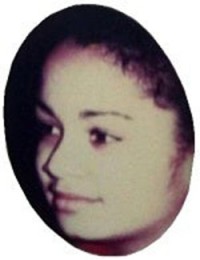
Johanna S. Gordon
Johanna S. Gordon, the youngest of the four Gordon children and a healthcare provider, lovingly describes her father, Dr. Edmund W. Gordon as an individual with high expectations of both himself and others. Johanna recalls her father’s unwavering support of others, insisting “you can always count on him and he’s always there when you need him.” Revealing her father’s generosity towards strangers, Johanna remembers her father’s response to an elderly gentleman who approached him in at a New England dedication to W.E.B. DuBois (one of her father’s heroes). Introducing himself as “Mr. Lovejoy,” Edmund did not hesitate to offer the man a sandwich and cup of hot soup, both served with a calm smile. Although the stranger did not stay for the dedication, Edmund’s kind demeanor left a lasting impression on family members who witnessed the incident. Characterizing her father as “a great writer, teacher, family member, citizen, an incredible mind, very sensitive, always evolving, a great chef, a lover of beauty, and [one who] never gives up,” Johanna is always amazed when she meets a stranger who tells her how her dad has touched their life.

Dr. Carl Kaestle
Dr. Carl Kaestle, a longtime friend and colleague, has worked diligently alongside Dr. Edmund W. Gordon as a proponent for the legacy of W.E.B. DuBois in Great Barrington, Massachusetts, the location of the DuBois family farm. As a historian of education, Carl has taken significant interest in Ed having known DuBois personally. Through their joint efforts, the accomplishments of DuBois, “one of the greatest American thinkers about educational opportunity, about civil rights, and about diversity,” now enjoy more widespread acknowledgement. In working with Ed to achieve common professional goals, Carl recalls fond memories “of penetrating, important observations [Ed] has made in meetings, in lectures, and in debates, insights that turned the conversation around or cast it in a new light.” Describing Ed and his wife, Dr. Susan G. Gordon, as “great conversationalists,” Carl characterizes the Gordons as “an inspiring couple, so accomplished, and yet so friendly and caring.” Citing his work at the center of federal policy on Head Start, Title I, and national testing, Carl contributes Ed’s professional success to his “tone or urgency and grace, along with original ways of thinking about old and emerging problems.” Describing “his combination of passion with grace, of broad vision with clarity, of old questions posed in new, fruitful ways” as the hallmarks of Ed Gordon’s legacy, Carl insists that Ed’s “greatest accomplishment is to push an agenda of civil rights and equal opportunity that is at once activist and urgent and on the other hand, thoughtful and collegial.”
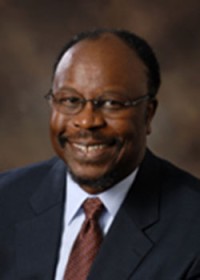
Dr. William Trent
Describing Dr. Edmund W. Gordon as a “friend, an intellectual and personal mentor, and a very dear colleague,” Dr. William Trent recalls that when sharing stories about their children, Ed enjoyed talking about his four children and their accomplishments. In fact, he “cheerfully mused about whether his influence as parent was what he intended or what they managed to select from it…[he discussed] the challenge of parenting bright and willful children.” When attempting to identify Ed’s significant personal and professional accomplishments, William insists that “there are too many of each” to name just a few. After careful consideration, William cites “the humanity in his scholarship which is [Ed’s] intellectual signature” as one aspect of his professional career that captures people. Ed’s “contemporariness” is his second major accomplishment, according to William. Describing his scholarship and leadership as having been “at the center or cutting edge on core issues of race, ethnicity, education, race relations, [and] human development for well over 4 decades,” William compares Ed to Miles Davis who gained notoriety for “always learning and listening to the musical ideas of the era he was in, refusing to repeat work from his past.” In addition to these professional accomplishments, Ed “fundamentally believes that his most significant, valued, and treasured personal accomplishment is his family.” Described as “his badge of honor [and] coat of arms,” to Ed, his family is at the center of his obvious, engaging spirituality.
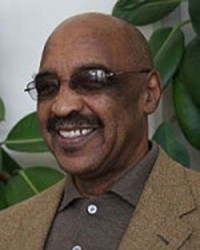
Dr. Ernest Washington
In the course of his thirty year friendship with Dr. Edmund W. Gordon, Dr. Ernest Washington characterizes Ed as “one of the brightest people [he] has ever met.” Commenting that he has met some pretty smart people, Ernie is convinced that Ed is very special. Although humor “does not come to mind” when thinking of his friendship with Ed, Ernie identifies instead ” a kind of sweet irony in which Ed sees the contradictions but does hold it against us.” Comparing the magnitude of Ed’s contributions to educational research to legendary jazz artists, Ernie reflects “when I think of Ed I think of a comment Miles Davis made about Duke Ellington. He said that at least once a year every jazz musician should get down on his knees and thank God for Duke Ellington.” Regarding Ed’s often unreported contributions to education and psychology, Ernie insists, “I think that each of us in education should at least once a year get down on our knees and thank God for Edmund Gordon.”
